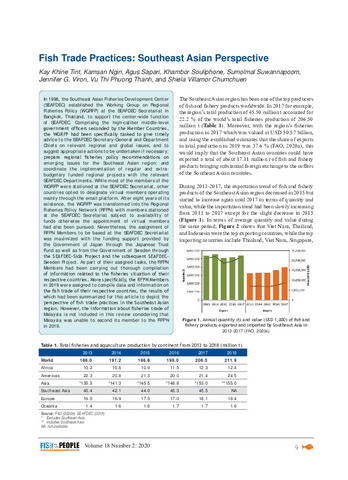| dc.description.abstract | In 1998, the Southeast Asian Fisheries Development Center (SEAFDEC) established the Working Group on Regional Fisheries Policy (WGRFP) at the SEAFDEC Secretariat in Bangkok, Thailand, to support the center-wide function of SEAFDEC. Comprising the high-caliber middle-level government officers seconded by the Member Countries, the WGRFP had been specifically tasked to give timely advice to the SEAFDEC Secretary-General and Department Chiefs on relevant regional and global issues, and to suggest appropriate actions to be undertaken if necessary; prepare regional fisheries policy recommendations on emerging issues for the Southeast Asian region; and coordinate the implementation of regular and extrabudgetary funded regional projects with the relevant SEAFDEC Departments. While most of the members of the WGRFP were stationed at the SEAFDEC Secretariat, other countries opted to designate virtual members operating mainly through the email platform. After eight years of its existence, the WGRFP was transformed into the Regional Fisheries Policy Network (RFPN) with members stationed at the SEAFDEC Secretariat subject to availability of funds otherwise the appointment of virtual members had also been pursued. Nevertheless, the assignment of RFPN Members to be based at the SEAFDEC Secretariat was maximized with the funding support provided by the Government of Japan through the Japanese Trust Fund as well as from the Government of Sweden through the SEAFDEC-Sida Project and the subsequent SEAFDECSweden Project. As part of their assigned tasks, the RFPN Members had been carrying out thorough compilation of information related to the fisheries situation of their respective countries. More specifically, the RFPN Members in 2019 were assigned to compile data and information on the fish trade of their respective countries, the results of which had been summarized for this article to depict the perspective of fish trade practices in the Southeast Asian region. However, the information about fisheries trade of Malaysia is not included in this review considering that Malaysia was unable to second its member to the RFPN in 2019. | en |

